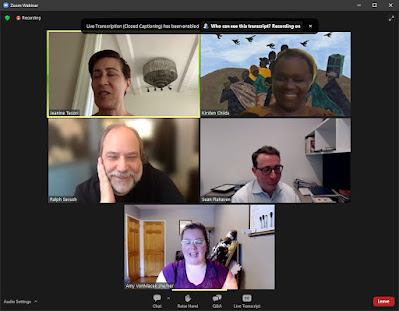We recently attended another webinar from the the Dramatist Guild's Production Compensation Series. It's was an in-depth discussion on Music Compensation Rights. The webinar was lead by Ralph Sevush, with an expert panel of contributors including: Sean Flahaven, Jeanine Tesori, Kirsten Childs and Amy VonMacek. We asked April Alsup, our local music theater expert, to represent PAP (The Performing Arts Project) in the webinar.
The first major takeaway from this session was that as a member of the Dramatist Guild there are lots of resources who are familiar with just about every aspect of the production compensation of Musical Theater works and they are willing to help whenever questions arise, but ultimately an agent and/or publisher should promote your works, manage your rights and they should always be working in your best interest.
 |
| Dramatist Guild Music Compensation Panel |
There are a lot ways to supplement the music of a theatrical piece. Are you playing your original music live, are you getting played on the radio? Are your songs placed in a TV show, film or commercial that is being played on TV? Songwriters get paid for these types of public performances and PROs (Performing Rights Organizations) like ASCAP and BMI are an integral part of how the music industry get these types of public performances licensed, tracked and then royalties paid to songwriters.
Here's some terminology:
Mechanical rights are regulated federally. In copyright law a mechanical license is a license from the holder of a copyright of a composition or musical work, to another party to create a "cover song", reproduce, or sample a portion of the original composition. It applies to copyrighted works that aren't free, open or in the public domain.
Synchronization rights are the agreements between the owner of a copyrighted composition and the user. A synchronization license grants permission for a user to release the song in other media formats. This permission is also called sync rights and your terms and conditions are completely negotiable.
Grand rights are a type of music licensing that specifically cover the right to perform musical compositions within the context of a dramatic work. This includes stage performances such as musical theater, concert dance, and arrangements of music from a dramatic work.
The license agreements of major Performance Rights Organization (PRO)s such as ASCAP and BMI do not cover grand rights and exclude the usage of compositions within "dramatic" works. Unlike small rights, grand rights must be negotiated directly with the publisher or copyright holder of the composition. Grand rights also differ from sync licensing, the licensing of music to synchronize with video content in films, videos, videogames, etc. Small rights is a term used to cover performances of individual songs in a concert or cabaret-type setting.
Print rights (licenses) provide a significant form of income for interested parties, despite new technology and new revenue streams. Two major sheet music companies are Hal Leonard and Alfred. Sheet Music for commercial music is roughly 1% of an artists revenue, but for music theater composers it can be as much 10% of the music revenue.
Providing your music digitally tends to have a greater amount of piracy issues since the files are easily copied, but the panelist agreed there isn't much you can do about it. Also, they said it's not uncommon for a sheet music provider to give an upfront advance of $25,000 for a completed music score and to be weary of contract provisions that include recuperation costs.
So that's a quick recap of the Music Compensation webinar. If you have any questions don't hesitate to reach out to us. We're glad to help you any way we can.